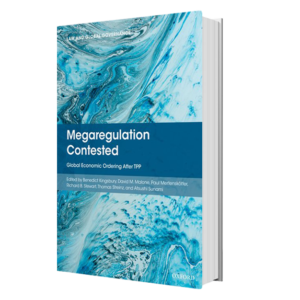Edited by Benedict Kingsbury, David M. Malone, Paul Mertenskötter, Richard B. Stewart, Thomas Streinz, and Atsushi Sunami

The Japan-led Trans-Pacific Partnership (CPTPP) of 2018 is the most far-reaching ‘megaregional’ economic agreement in force, with several major countries beyond its eleven negotiating countries also interested. Still bearing the stamp of the original US involvement before the Trump-era reversal, TPP is the first instance of ‘megaregulation’: a demanding combination of inter-state economic ordering and national regulatory governance on a highly ambitious substantive and trans-regional scale. Its text and ambition have influenced other negotiations ranging from the Japan-EU Agreement (JEEPA) and the US-Mexico-Canada Agreement (USMCA) to the projected Pan-Asian Regional Comprehensive Economic Partnership (RCEP).
This book provides an extensive analysis of TPP as a megaregulatory project for channelling and managing new pressures of globalization, and of core critical arguments made against economic megaregulation from standpoints of development, inequality, labour rights, environmental interests, corporate capture, and elite governance. Specialized chapters cover supply chains, digital economy, trade facilitation, intellectual property, currency levels, competition and state-owned enterprises, government procurement, investment, prescriptions for national regulation, and the TPP institutions. Country studies include detailed analyses of TPP-related politics and approaches in Japan, Mexico, Brazil, China, India, Indonesia, and Thailand. Contributors include leading practitioners and scholars in law, economics, and political science. At a time when the WTO and other global-scale institutions are struggling with economic nationalism and geopolitics, and bilateral and regional agreements are pressed by public disagreement and incompatibility with digital and capital and value chain flows, the megaregional ambition of TPP is increasingly important as a precedent requiring the close scrutiny this book presents.
Order the book on OUP UK
Order the book on OUP US
Table of Contents
Chapter 1: Introduction: The Essence, Significance, and Problems of the Trans-Pacific Partnership Benedict Kingsbury, David Malone, Paul Mertenskötter, Richard B. Stewart, Thomas Streinz, and Atsushi Sunami
ClosePart I: Megaregulation, Geopolitics, and Ordering Projects
Chapter 2: The Trans-Pacific Partnership as Megaregulation Benedict Kingsbury, Paul Mertenskötter, Richard B. Stewart, and Thomas Streinz
Chapter 3: The Uncertain Geostrategic Outlook for the US in Asia: The Pivot, the Rebalance, TPP, and Now What? David Malone
Chapter 4: China and TPP: A Tale of Two Economic Orderings? Jing Tao
ClosePart II Contesting Megaregulation: Distribution, Inequality, and Development
Chapter 5: The Politics of Expertise in Transnational Economic Governance: Breaking the Cycle Annelise Riles
Chapter 6: Class, Power, and Inequality in Megaregulation: The TPP Model B.S. Chimni
Chapter 7: The Lessons of TPP and the Future of Labor Chapters in Trade Agreements Alvaro Santos
Chapter 8: TPP and Environmental Regulation Errol Meidigner
Chapter 9: Customs Administration and Trade Facilitation: The Missing Development Agenda Antonia Eliason
ClosePart III Transnational Business: Global Value Chains and the Digital Economy
Chapter 10: In a World of Value Chains: What Space for Regulatory Coherence and Cooperation in Trade Agreements?, Bernard Hoekman and Charles Sabel
Chapter 11: Globally Intertwined Markets: Business Structures and International Economic Regulation, Donald Robertson
Chapter 12: TPP’s Business Asymmetries: Megaregulation and the Conditions of Competition between MNCs and SMEs, Dan Ciuriak
Chapter 13: Sales, Sourcing, or Regulation? Evidence from TPP on What Drives US Corporate Support for Trade, Iain Osgood
Chapter 14: Digital Megaregulation Uncontested? TPP’s Model for the Global Digital Economy, Thomas Streinz
ClosePart IV Megaregulation, the Regulatory State, and the Market
Chapter 15: Harmonization: Top Down, Bottom Up-and Now Sideways? The Impact of the IP Provisions of Megaregional Agreements on Third Party States, Rochelle Dreyfuss
Chapter 16: Thailand and Public Health: Looking Beyond the Intellectual Property Chapter in TPP, Kiyoshi Adachi
Chapter 17: Megaregulatory Administrative Law: An Instrument of Political Control, Richard B. Stewart and Paul Mertenskötter
Chapter 18: Choices and Consequences: Internationalizing Competition Policy After TPP, Daniel Francis
Chapter 19: Challenges of Opening by Megaregulation: Indonesia and Government Procurement Disciplines, Joseph Wira Koesnaidi and Wahyuni Bahar
Chapter 20: Leveraging National Regulatory Reform in Japan and the Economic Modeling of Trade Agreements, Atsushi Sunami, Kenichi Kawasaki, Yoko Ikeda, and Michael C. Huang
Chapter 21: Regulating Regulation: Impact Assessments and Trade, Michael Livermore and Jason Schwartz
Chapter 22: Trade and Exchange Rates: The Joint Declaration of the Macroeconomic Policy Authorities of TPP Countries, Naoyuki Yoshino, Pornipum Chantapacdepong, and Matthias Helble
ClosePart V Megaregulatory Treaty Institutions
Chapter 23: The Institutional Governance of Global Trade and Regulation: Back to the Future?, Robert Howse
Chapter 24: State-to-State Dispute Settlement in Megaregionals, Donald McRae
Chapter 25: Finding a Workable Balance between Investor Protection and the Public Interest in TPP, Chin Leng Lim
ClosePart VI National Politics of Megaregulatory Agreements
Chapter 26: Japan: Interest Group Politics, Foreign Policy Linkages, and TPP, Christina Davis
Chapter 27: Structuring Participation: Public Comments and the Dynamics of US Trade Negotiations, Robert Gulotty
Chapter 28: Mexican Politics of Global Trade and Law in Times of Trump: After TPP is Before TPP, Alejandro Rodiles
Chapter 29: Regional and Preferential Agreements: The Pacific and Atlantic Styles in Latin America, Rodrigo Polanco Lazo
Chapter 30: Brazil in the Shadow of TPP: Beyond the Grand Debate, Pragmatic Responses, David M. Trubek, Fabio Morosini, and Michelle Sanchez Badin
Chapter 31: India and TPP: The Emerging Scenario, Harsha Vardhana Singh
Close







